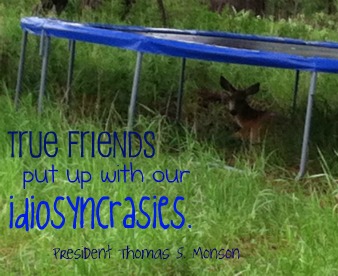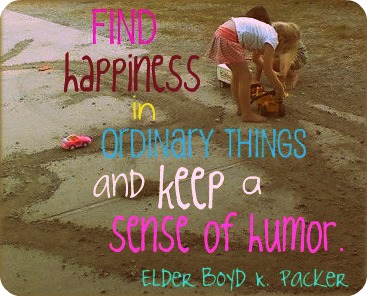Space—the final frontier. The stage for epic intergalactic battles and alien foes. Science fiction classics like “Ender’s Game,” “Star Wars” and “Star Trek” transport us to other worlds, alternate universes where Ewoks, Buggers and Klingons reside. But science fiction is also about two worlds colliding—and what happens when they do. Different worlds, different cultures, different peoples and/or species who may not speak the same language or share the same beliefs. We may never encounter an extraterrestrial being in our lives—but we’ve all met another person who just seemed to be from a different planet. Maybe we were the ones feeling like the alien—someone who just didn’t fit in, or didn’t belong. Author Orson Scott Card—best known for his sci-fi novels as well as a member of The Church of Jesus Christ of Latter-day Saints (sometimes inadvertently called the Mormon Church)—said:
In a way, being a Mormon prepares you to deal with science fiction, because we live simultaneously in two very different cultures. The result is that we all know what it’s like to be strangers in a strange land. It’s not just a coincidence that there are so many effective Mormon science fiction writers. We don’t regard being an alien as an alien experience. But it also means that we’re not surprised when people don’t understand what we’re saying or what we think. It’s easy to misinterpret us. [1]
As a Latter-day Saint myself, I love this perspective. But in a way, I think it’s true for everyone. At some point in our lives, we’ll feel like the alien—and at another point, we’ll feel like the earthling encountering the alien. From my own perspective as an earthling and a Latter-day Saint, here are 5 universal truths we learn from alien encounters—literal and figurative ones.Don’t blast off too soon—or jump to conclusions.
- Don’t blast off too soon—or jump to conclusions
During the countdown to any blastoff, the rocket is not launched until the countdown is finished. This gives everyone time to prepare. Too many misunderstandings and arguments occur because someone jumped to conclusions—or didn’t wait for the countdown to finish. In “Ender’s Game,” an entire insectoid alien species is almost wiped out because of a misunderstanding. The two sides didn’t stop to figure out what was really going on.
In our own lives, the fate of a species is rarely at stake—but our relationships with family, friends and strangers often are. Elder Dallin H. Oaks, a member of the Quorum of the Twelve Apostles—with the First Presidency, the governing body of The Church of Jesus Christ—said:
We should, if possible, refrain from judging until we have adequate knowledge of the facts. … Someone has said that you cannot slice cheese so fine that it doesn’t have two sides. [2]
Elder M. Russell Ballard, an Apostle of Jesus Christ, said:
Perceptions and assumptions can be very dangerous and unfair. … Surely good neighbors should put forth every effort to understand each other and to be kind to one another regardless of religion, nationality, race, or culture. [3]
-
Put yourself in the alien’s shoes
This insight and understanding leads to compassion and empathy—and reaching out to those around us. President Thomas S. Monson, the president of The Church of Jesus Christ, said:
There is a serious need for the charity that gives attention to those who are unnoticed, hope to those who are discouraged, aid to those who are afflicted. True charity is love in action. The need for charity is everywhere.
Needed is the charity which refuses to find satisfaction in hearing or in repeating the reports of misfortunes that come to others, unless by so doing, the unfortunate one may be benefited. The American educator and politician Horace Mann once said, “To pity distress is but human; to relieve it is godlike.”
Charity is having patience with someone who has let us down. It is resisting the impulse to become offended easily. It is accepting weaknesses and shortcomings. It is accepting people as they truly are. It is looking beyond physical appearances to attributes that will not dim through time. It is resisting the impulse to categorize others. [4]
- True friendship can build bridges between worlds
The Savior teaches this same lesson of seeing past our differences in the parable of the Good Samaritan. In it, a Jewish man is beaten, robbed and left for dead on a highway. Two religious men pass him by without helping. Then a Samaritan stops and renders aid to the injured man. (See Luke 10:25–37.) Of this, Elder Ballard said:
Every time I read this parable I am impressed with its power and its simplicity. But have you ever wondered why the Savior chose to make the hero of this story a Samaritan? There was considerable antipathy between the Jews and the Samaritans at the time of Christ. Under normal circumstances, these two groups avoided association with each other.
His deliberate use of Jews and Samaritans clearly teaches that we are all neighbors and that we should love, esteem, respect, and serve one another despite our deepest differences—including religious, political, and cultural differences. …If we are truly disciples of the Lord Jesus Christ, we will reach out with love and understanding to all of our neighbors at all times, particularly in times of need. [3]
True friendships are based on the commonalities we all share—and not on the differences we all have. President Dieter F. Uchtdorf (the second counselor in the First Presidency of The Church of Jesus Christ) has a recipe for family success that is just as applicable to friendships—intergalactic or just between humans. He said:
In family relationships love is really spelled t-i-m-e, time. Taking time for each other is the key for harmony at home. We talk with, rather than about, each other. We learn from each other, and we appreciate our differences as well as our commonalities. [5]
4. Working together for the common good makes the universe go round
If there’s one thing we learn from science fiction and alien encounters, it’s this—one person can make a difference, but everyone must work together to make the universe a better place. Whether it’s protecting a planet from destruction or another species from annihilation, we all have to work together to get it done. Sometimes that requires us to lay aside our deepest differences. In “Star Trek: The Next Generation,” the crew of the Enterprise is intergalactically diverse—with humans, Klingons, Androids and other species working together to help others. The crew must work together to complete their assignments—each individual plays a crucial role in the execution of the task.Elder Ballard offers an earth-life example of this:
Honeybees are driven to pollinate, gather nectar, and condense the nectar into honey. It is their magnificent obsession imprinted into their genetic makeup by our Creator. It is estimated that to produce just one pound (0.45 kg) of honey, the average hive of 20,000 to 60,000 bees must collectively visit millions of flowers and travel the equivalent of two times around the world. Over its short lifetime of just a few weeks to four months, a single honeybee’s contribution of honey to its hive is a mere one-twelfth of one teaspoon.
Though seemingly insignificant when compared to the total, each bee’s one-twelfth of a teaspoon of honey is vital to the life of the hive. The bees depend on each other. Work that would be overwhelming for a few bees to do becomes lighter because all of the bees faithfully do their part. [6]
The same applies to us as humans—when we all do our part and work together, we can accomplish much good.
- Aliens and Androids can help us remember what it means to be human
Enjoy my full range of emotions and experiences. Because without them, life wouldn’t be as much fun.
We can find happiness in the simple joys of life. We don’t need everything—just the full range of human emotions to have a rich and meaningful life… no matter which planet we live on. Elder Richard G. Scott said:
Children teach us how to find joy even under the most challenging circumstances. Children haven’t yet learned to be depressed by concentrating on the things they don’t have. They find joy in what is available to them. I remember a small boy playing along a riverbank. He had tied a piece of fishing line to the ends of two discarded soft-drink cans. He threw one can over a limb, then filled it with water. He would pull on the other can, then let it go. The weight of the first can would draw the second one up as it fell. He laughed and danced with glee. Simple, rejuvenating experiences surround us. [7]
It’s amazing the things that we can learn from extraterrestrial encounters—even an imaginary ones. Life lessons are all around us… we just need to look for them.




